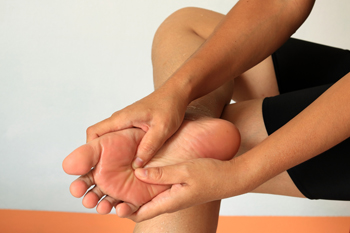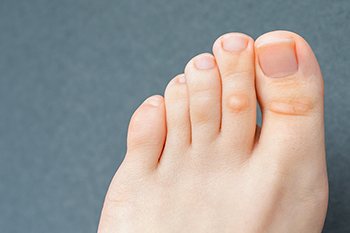Items filtered by date: January 2022
What Causes My Feet to Smell Bad?
 Foot odor is typically caused by too much sweat being produced by the glands in the feet. Each foot has about a quarter of a million sweat glands that produce around a cup of sweat a day. When bacteria from the soles of the feet are combined with sweat, an odor may develop. Causes include not washing your feet daily, wearing the same socks day after day, and wearing shoes so tight that they don’t allow the sweat to evaporate. In addition, a fungal infection can cause foot odor, and hyperhidrosis, a condition known as sweaty feet, can exacerbate the problem. To reduce existing foot odor, it’s a good idea to wash your feet daily with antibacterial soap and dry them thoroughly. You can also use an antiperspirant spray or powder on your feet. Change your socks every day, and give your shoes at least a day to air out before wearing them again. If, after taking these precautions, the odor lingers, it is suggested that you see a podiatrist who can examine the area and offer a more in-depth treatment plan.
Foot odor is typically caused by too much sweat being produced by the glands in the feet. Each foot has about a quarter of a million sweat glands that produce around a cup of sweat a day. When bacteria from the soles of the feet are combined with sweat, an odor may develop. Causes include not washing your feet daily, wearing the same socks day after day, and wearing shoes so tight that they don’t allow the sweat to evaporate. In addition, a fungal infection can cause foot odor, and hyperhidrosis, a condition known as sweaty feet, can exacerbate the problem. To reduce existing foot odor, it’s a good idea to wash your feet daily with antibacterial soap and dry them thoroughly. You can also use an antiperspirant spray or powder on your feet. Change your socks every day, and give your shoes at least a day to air out before wearing them again. If, after taking these precautions, the odor lingers, it is suggested that you see a podiatrist who can examine the area and offer a more in-depth treatment plan.
Everyday foot care is very important to prevent infection and other foot ailments. If you need your feet checked, contact Jordan S. Steinberg, DPM from Florham Park Podiatry . Our doctor can provide the care you need to keep you pain-free and on your feet.
Everyday Foot Care
Often, people take care of their bodies, face and hair more so than they do for their feet. But the feet are a very important aspect of our bodies, and one that we should pay more attention to. Without our feet, we would not be able to perform most daily tasks.
It is best to check your feet regularly to make sure there are no new bruises or cuts that you may not have noticed before. For dry feet, moisturizer can easily be a remedy and can be applied as often as necessary to the affected areas. Wearing shoes that fit well can also help you maintain good foot health, as well as making it easier to walk and do daily activities without the stress or pain of ill-fitting shoes, high heels, or even flip flops. Wearing clean socks with closed shoes is important to ensure that sweat and bacteria do not accumulate within the shoe. Clean socks help to prevent Athlete’s foot, fungi problems, bad odors, and can absorb sweat.
If you have any questions please feel free to contact our office located in Florham Park, NJ . We offer the newest diagnostic and treatment technologies for all your foot and ankle needs.
What Is Peripheral Neuropathy?
Peripheral neuropathy is nerve damage within the peripheral nervous system, which communicates with the central nervous system (involving the brain and spinal cord). Diabetes often causes peripheral neuropathy, however, it can also occur due to genetics, infections, injuries, hormonal imbalances, or other medical conditions. Peripheral neuropathy may cause numbness, weakness, muscle twitching or cramps, changes in nails, skin and hair, and a pins-and-needles sensation in the legs and feet. It may also be difficult to maintain balance or feel changes in temperature or pain, and you may experience disturbances in your emotions and sleep patterns. If you have any of these symptoms, it is suggested that you contact a podiatrist. They can help diagnose peripheral neuropathy and manage its symptoms with oral medications, orthotic devices, regular checkups and advice on proper foot care.
Neuropathy
Neuropathy can be a potentially serious condition, especially if it is left undiagnosed. If you have any concerns that you may be experiencing nerve loss in your feet, consult with Jordan S. Steinberg, DPM from Florham Park Podiatry . Our doctor will assess your condition and provide you with quality foot and ankle treatment for neuropathy.
What Is Neuropathy?
Neuropathy is a condition that leads to damage to the nerves in the body. Peripheral neuropathy, or neuropathy that affects your peripheral nervous system, usually occurs in the feet. Neuropathy can be triggered by a number of different causes. Such causes include diabetes, infections, cancers, disorders, and toxic substances.
Symptoms of Neuropathy Include:
- Numbness
- Sensation loss
- Prickling and tingling sensations
- Throbbing, freezing, burning pains
- Muscle weakness
Those with diabetes are at serious risk due to being unable to feel an ulcer on their feet. Diabetics usually also suffer from poor blood circulation. This can lead to the wound not healing, infections occurring, and the limb may have to be amputated.
Treatment
To treat neuropathy in the foot, podiatrists will first diagnose the cause of the neuropathy. Figuring out the underlying cause of the neuropathy will allow the podiatrist to prescribe the best treatment, whether it be caused by diabetes, toxic substance exposure, infection, etc. If the nerve has not died, then it’s possible that sensation may be able to return to the foot.
Pain medication may be issued for pain. Electrical nerve stimulation can be used to stimulate nerves. If the neuropathy is caused from pressure on the nerves, then surgery may be necessary.
If you have any questions, please feel free to contact our office located in Florham Park, NJ . We offer the newest diagnostic and treatment technologies for all your foot care needs.
Why Do Corns Form on the Feet?
Corns are patches of thickened, hardened, raised skin that can develop on the soles of the feet or on the toes in response to excessive pressure or friction. Your skin contains a protein called keratin. This protein holds the skin cells together and helps your skin protect itself from the elements. When your skin is exposed to friction or pressure over and over again, it responds by producing a thick, tough layer of keratin over the injured area, leading to a corn or callus. Although corns arise as a protective measure, they can sometimes cause more harm than good. You may find that a corn is causing you pain or discomfort when you walk, or that it rubs against your shoes uncomfortably. In some cases, a corn can also become infected. If you have painful corns, it is suggested that you see a podiatrist for treatment.
If you have any concerns regarding your feet and ankles, contact Jordan S. Steinberg, DPM of Florham Park Podiatry . Our doctor will treat your foot and ankle needs.
Corns: What Are They? and How Do You Get Rid of Them?
Corns can be described as areas of the skin that have thickened to the point of becoming painful or irritating. They are often layers and layers of the skin that have become dry and rough, and are normally smaller than calluses.
Ways to Prevent Corns
There are many ways to get rid of painful corns such as wearing:
- Well-fitting socks
- Comfortable shoes that are not tight around your foot
- Shoes that offer support
Treating Corns
Treatment of corns involves removing the dead skin that has built up in the specific area of the foot. Consult with Our doctor to determine the best treatment option for your case of corns.
If you have any questions please feel free to contact our office located in Florham Park, NJ . We offer the newest diagnostic and treatment technologies for all your foot and ankle needs.
Do You Suffer From Painful Feet?
How Can I Get Rid of Warts on My Feet?
 If you spend a lot of time in gym locker rooms or at swimming pools, you may end up noticing growths on the bottom of your feet. These are known as plantar warts. They are caused by a virus (human papillomavirus or HPV) that infects the soles of your feet. HPV is transmitted by direct contact, and an open sore or crack on the feet may increase your chances of infection. The wart looks like a flat spot on the skin with a depressed area in the center. It may be yellow and have a black spot in the middle. Treatments include applying salicylic acid to the area, liquid nitrogen to freeze the wart, or simply having the wart removed surgically. Plantar warts have a habit of coming back, so adhering to treatment is essential. Prevention techniques include wearing foot coverings in pools, locker rooms, or dorms, as well as keeping the infected area covered and washing your hands frequently to avoid spreading the virus to other parts of your body. To find out more about the treatment and removal of plantar warts, a visit to a podiatrist is highly suggested.
If you spend a lot of time in gym locker rooms or at swimming pools, you may end up noticing growths on the bottom of your feet. These are known as plantar warts. They are caused by a virus (human papillomavirus or HPV) that infects the soles of your feet. HPV is transmitted by direct contact, and an open sore or crack on the feet may increase your chances of infection. The wart looks like a flat spot on the skin with a depressed area in the center. It may be yellow and have a black spot in the middle. Treatments include applying salicylic acid to the area, liquid nitrogen to freeze the wart, or simply having the wart removed surgically. Plantar warts have a habit of coming back, so adhering to treatment is essential. Prevention techniques include wearing foot coverings in pools, locker rooms, or dorms, as well as keeping the infected area covered and washing your hands frequently to avoid spreading the virus to other parts of your body. To find out more about the treatment and removal of plantar warts, a visit to a podiatrist is highly suggested.
Plantar warts can be very uncomfortable. If you need your feet checked, contact Jordan S. Steinberg, DPM from Florham Park Podiatry . Our doctor will assist you with all of your foot and ankle needs.
About Plantar Warts
Plantar warts are the result of HPV, or human papillomavirus, getting into open wounds on the feet. They are mostly found on the heels or balls of the feet.
While plantar warts are generally harmless, those experiencing excessive pain or those suffering from diabetes or a compromised immune system require immediate medical care. Plantar warts are easily diagnosed, usually through scraping off a bit of rough skin or by getting a biopsy.
Symptoms
- Lesions on the bottom of your feet, usually rough and grainy
- Hard or thick callused spots
- Wart seeds, which are small clotted blood vessels that look like little black spots
- Pain, discomfort, or tenderness of your feet when walking or standing
Treatment
- Freezing
- Electric tool removal
- Laser Treatment
- Topical Creams (prescription only)
- Over-the-counter medications
To help prevent developing plantar warts, avoid walking barefoot over abrasive surfaces that can cause cuts or wounds for HPV to get into. Avoiding direct contact with other warts, as well as not picking or rubbing existing warts, can help prevent the further spread of plantar warts. However, if you think you have developed plantar warts, speak to your podiatrist. He or she can diagnose the warts on your feet and recommend the appropriate treatment options.
If you have any questions please feel free to contact our office located in Florham Park, NJ . We offer the newest diagnostic and treatment technologies for all your foot and ankle needs.



